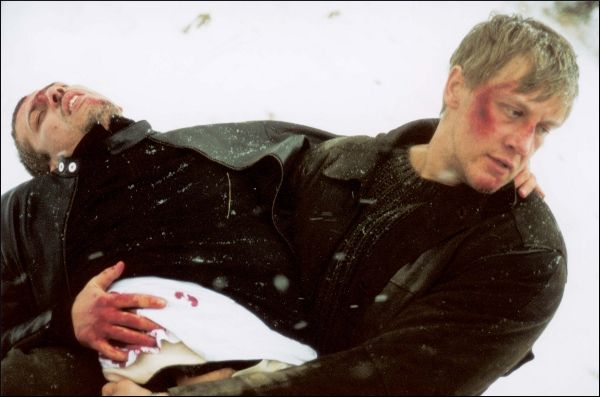The crime drama Bumer, directed by Pytor Buslov, was one of the first Russian box-office hits after the economically chaotic 90s. It focuses on four friends, mid-level gangsters, who have to escape from their native Moscow in a stolen black BMW (a bumer, in slang terms) after accidentally killing an undercover secret service agent during a gang dispute. Their escape becomes a symbolic journey through the wilderness of Russia's small towns, and they encounter other gangs, corrupt police officers, and village healers and fools as they make their way towards a remote hiding spot.
A lot of the film’s human interaction is based on raw, animalistic violence and a level of lawlessness recalling America's Wild West. Bribery, intimidation, and gunfire follow the friends’ journey, which becomes as much a character in the film as the protagonists, a stolen prestige symbol adrift in a relentlessly violent environment.
"Bumer, directed by Pytor Buslov, was one of the first Russian box-office hits after the economically chaotic 90s."
Like many Russian films of the crime genre, Bumer has been criticized for allegedly romanticizing the criminal underworld. Wherever one may stand on the issue, the film doubtlessly works as a realistic – and at times quite challenging – excursion into criminal slang, which originated among actual gang members and has quickly spilled over into youth slang, thus becoming more commonly used among non-gangsters and, perhaps, aspiring ones.
Quite often, the characters use entire sentences composed of slang variations and, to understand them, a general familiarity with the vocabulary would be necessary. Members of a criminal organization are commonly referred to as “братва/bratvá” (brotherhood), which also works when directly addressing the group in question (without being insulting), as in “у все, братва, удачи/nu vsyo, bratva, udachi" (alright, bratvá, good luck to you). Another, similar word, less marked by a criminal origin, is the frequently used “пацаны/patsaný” (boys or lads).

There are many other slang terms in Bumer. A “лох/lokh” is a fool, an outsider, or a victim, an acronym of “Личность Обманутая Хулиганом/Lichnost Obmanutaya Khuliganom” (person deceived by a hooligan). “терки/Tyorki,” which could be translated as "rubbings" or "shreddings," is a term for face-to-face gang disputes. A "car" is usually a “тачка/tachká” (literally, a "cart") instead of the common “машина/mashina,” and "money" is repeatedly referred to as “лаве/lave” (originally a gypsy term).
Verbs are also heavily substituted. Some are direct substitutions, such as “шмалять/shmalyát’” (instead of "стрелять/strelyát'”) for “to shoot.” Others are regular words amplified to fit a certain specific niche not covered by common usage. The verb “базарить/bazárit,” for instance, is derived from "bazaar," and it means "to talk pointlessly and at length." “замутить/Zamutít’” is a commonly used verb that means something along the lines of “to prepare” or “to organize,” while another common verb is “беспределить/bespredelit,” derived from the noun "беспредел/bespredel" (limitlessness), meaning chaotic, impulsive, often violent behavior. To "bespredelit," therefore, is to perpetrate this kind of behavior. The characters are repeatedly accused of "bespredel" by other gangs when they (supposedly) try to steal gasoline from others.
"Pyotr Buslov stood at the beginning of a turning point in Russian cinema, bridging the nineties and the aughts and skillfully combining a marketable genre with the depiction of socially relevant problems."
What also obviously characterizes Russian criminal slang (which is not censored from the characters' speech in Bumer) is the extensive use of "mat" profanities. The characters frequently use insults during heated disputes, such as “сука/suka” (bitch), “гандон/gandon” (literally: "condom," effectively: "bitch"), and “блядь/blyad” (whore). Also typical is the use of the word “хрен/khren” (dick) in various situations, such as “на хрена?/na khrená?” (What the fuck for?), “не хрена/ne krhená” (a vulgar negation of something), or “не доедем не хрена/ne doedem ne khrena” (We'll never fucking get there).
However, when listening to the characters in Bumer, the translation of the words alone may not suffice. Their sentences are often strung together in a combination of these words, according to certain, often intuitive, rules: “Хрен ты нам это фуфло фтюхиваешь, лохов нашел?/Khren ty nam eto fuflo vtyukhivaesh, lokhov nashel?” (The fuck you trying to plant this shit on us, we look like fools or what?)
Bumer remains one of the most popular Russian films of the previous decade. The ringtone used by one of the protagonists is still instantly recognizable to most Russians, and the movie launched the career of Pyotr Buslov, who to this day remains one of the most commercially successful Russian directors. He stood at the beginning of a turning point in Russian cinema, bridging the nineties and the aughts and skillfully combining a marketable genre with the depiction of socially relevant problems.





